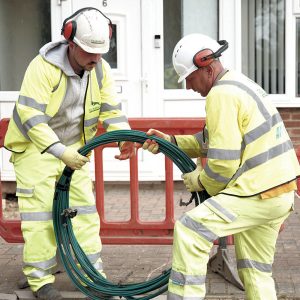Sponsored Links
UK Commission for Rural Communities Demands Faster Broadband
Posted: 23rd Jun, 2009 By: MarkJ
The Commission for Rural Communities (CRC) has warned that Lord Carter's Digital Britain Report (here) pledge of making a minimum UK broadband speed of 2012 available to everybody by 2012 may not be enough. The warning is part of CRC's 'Mind the Gap: Digital England - a rural perspective' (Adobe Reader .PDF) report.
Interestingly the CRC initially appears to agree with Carter's Digital Britain report, sighting three potential methods for deploying a 2Mbps USC: Upgrades to existing land-lines, Mobile Broadband / Wi-Fi (Wireless) and Satellite .
However, unlike Digital Britain, the CRC do highlight problems with capacity and flexibility on Mobile Broadband networks, not to mention the latency and similar flexibility issues that appear to be inherent with Satellite; the latter is termed a “stop-gap” solution by the report due to its limitations.
Curiously the report claims that Mobile Broadband services are "based on low transfer allowances and high per-Megabit fees for excess use", which is somewhat unfair given the current packages on offer. Certainly excessive use fees are a problem, although most packages are well priced and some offer very attractive usage allowances.
It's worth pointing out that two key issues - that of Satellite affordability (hardware costs in particular) and Mobile Broadband service restrictions (inability to use VoIP etc.) - do not appear to have been well covered in the report.
“The Digital Britain report calls for the communications infrastructure to meet the demands of a modern knowledge-based economy, and this resonates strongly in rural communities. But providers’ investment must take account of social impacts and benefits as well as economic criteria. We recommend that alternative investment models for rural areas are adopted," says Graham Russell, CRC Executive Director.
“Rural users are frustrated by the lack of speed and reliability of existing services. Those unable to access broadband are excluded from what, for a large section of the population, are now basic services. Digital technology can help tackle social and economic disadvantage in rural areas."
“Rural users are frustrated by the lack of speed and reliability of existing services. Those unable to access broadband are excluded from what, for a large section of the population, are now basic services. Digital technology can help tackle social and economic disadvantage in rural areas."
Interestingly the CRC initially appears to agree with Carter's Digital Britain report, sighting three potential methods for deploying a 2Mbps USC: Upgrades to existing land-lines, Mobile Broadband / Wi-Fi (Wireless) and Satellite .
However, unlike Digital Britain, the CRC do highlight problems with capacity and flexibility on Mobile Broadband networks, not to mention the latency and similar flexibility issues that appear to be inherent with Satellite; the latter is termed a “stop-gap” solution by the report due to its limitations.
Curiously the report claims that Mobile Broadband services are "based on low transfer allowances and high per-Megabit fees for excess use", which is somewhat unfair given the current packages on offer. Certainly excessive use fees are a problem, although most packages are well priced and some offer very attractive usage allowances.
Mr Russell concludes: “We fully support Government’s commitment to universal service at 2Mbps by 2012. Moves to fund Next Generation Access are also welcome, as we firmly believe that first generation broadband is unlikely to be capable of meeting the needs of a large proportion of rural areas. We recognise, however, that Next Generation Access is a colossal financial undertaking and likely to be more complex and take longer in remote areas.”
It's worth pointing out that two key issues - that of Satellite affordability (hardware costs in particular) and Mobile Broadband service restrictions (inability to use VoIP etc.) - do not appear to have been well covered in the report.
Search ISP News
Search ISP Listings
Search ISP Reviews
Latest UK ISP News








Cheap BIG ISPs for 100Mbps+
150,000+ Customers | View More ISPs
Cheapest ISPs for 100Mbps+
Modest Availability | View More ISPs
Latest UK ISP News
Helpful ISP Guides and Tips
Sponsored Links
The Top 15 Category Tags
- FTTP (6852)
- BT (3900)
- Politics (3096)
- Business (2793)
- Openreach (2680)
- Building Digital UK (2523)
- Mobile Broadband (2499)
- FTTC (2148)
- Statistics (2146)
- 4G (2114)
- Virgin Media (2040)
- Ofcom Regulation (1790)
- 5G (1756)
- Fibre Optic (1610)
- Wireless Internet (1605)
Sponsored
Copyright © 1999 to Present - ISPreview.co.uk - All Rights Reserved - Terms , Privacy and Cookie Policy , Links , Website Rules






























